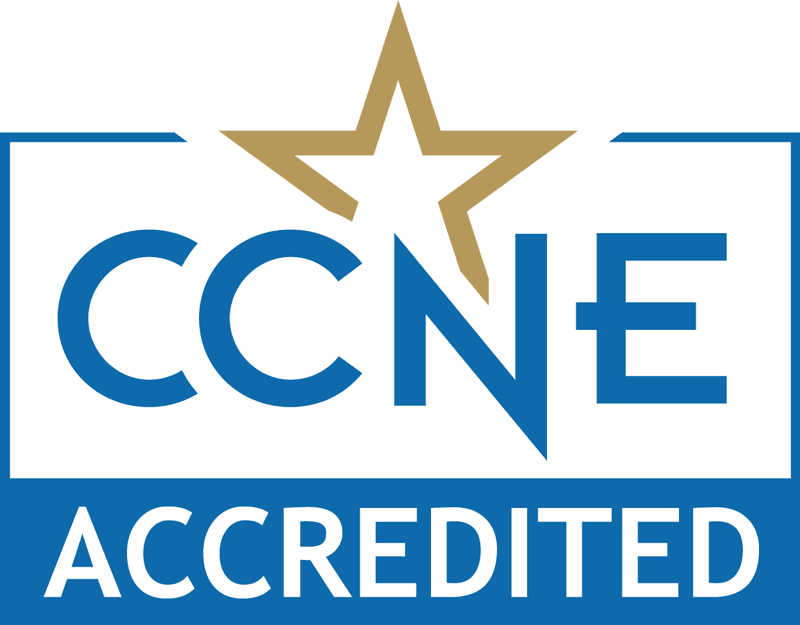Nursing
BS
Program introduction and alerts
Earn your BSN
UMass Dartmouth's bachelor of science in nursing program provides a seamless progression from student to practicing nurse.
Today's nurses must be knowledgeable and analytical, caring and creative. They are key members—and often the leaders—of teams of health care professionals. The College of Nursing & Health Sciences provides the comprehensive education, both theoretical and practical, needed in this challenging and rewarding profession.
Undergraduate nursing applicants are accepted for fall admission only.
Program curriculum and details
As an incoming student, you will be assigned a faculty advisor who understands your career goals and will work with you throughout the entire program.
In your first year, you'll experience your first nursing course and build a strong core of knowledge in select science courses.
Before you go into the field, our modern nursing lab provides you with the tools and equipment you’ll need to:
- assess patients
- interact with colleagues
- utilize complex care management software
Years two and three feature clinical, in-the-field placements at partner sites throughout the region, including hospitals, clinics, and long-term care facilities. During your final year, you’ll be paired with a registered nurse. This partnership allows you to provide real care to real patients. Your mentor will be by your side for advice and encouragement.
It all adds up to a nationally recognized, competitive program that is accredited by the Commission on Collegiate Nursing Education and is recommended by the American Nurses Association.
The College of Nursing & Health Sciences provides you with the most current perspectives on the discipline of nursing based upon the values, skills, and competencies essential for nursing practice in the 21st century.
- First year: you will be introduced to core nursing concepts, values, and beliefs—and your university studies in the sciences and liberal arts will provide a strong foundation for concepts you will encounter in the study of nursing.
- Second year: you will begin to acquire the skills in observation and communication necessary to assess an individual’s needs, set measurable and realistic goals of nursing care, and utilize evidence-based interventions to maximize health.
- Third year: emphasizes the transfer and application of knowledge in clinical situations. You will develop skills in caring for acutely ill adults, childbearing and childrearing families in the hospital and community, and populations at risk in communities. The family as a unit of care, as well as populations at risk in communities, become the foci for the nursing process.
- Senior year: you will learn how to collaborate with members of the healthcare team, advocate for the needs of patients, and intervene to shape the healthcare environment. You will refine the skills required to manage the complex health needs of individuals, groups, and populations. The emphasis is on the analysis and synthesis of knowledge to maximize health.
Your capstone experience—in the last half of the final year—facilitates this process. Students assume the role of a professional nurse, under the supervision and guidance of a staff nurse mentor.
For the BS in nursing, you will complete a total of 120 credits.
Important Note for Prospective Students:
The College of Nursing & Health Sciences has determined that the nursing major curriculum meets state educational requirements for professional licensure or certification in the following states:
- Massachusetts
- Rhode Island
The College of Nursing & Health Sciences has not determined whether the nursing major curriculum meets educational requirements for licensure in other states and jurisdictions. A complete list with the determinations will be available in the near future.
If you are considering an academic program that leads to a professional license in your state, it is highly recommended that you first seek guidance from the appropriate licensing agency in your home state before beginning the academic program located outside your state. State requirements can be found at ncsbn.org.
Course descriptions, schedules and requirements
Nursing major mean starting salary: $70,742
NACE Data Collection of Class of 2023 Undergraduate Alumni
- Community: each class has a faculty advisor, and classmates meet regularly as a group to share clinical experiences
- International experiences: enroll in an international community health nursing experience
- Involvement: participate in the UMassD chapter of the National Student Nurse Asociation
- Nursing Labs & Media Center: gain valuable skills in the college's clinical simulation lab, physical assessment exam rooms, and state-of-the-art media center
- Scholarships: are available for nursing students, based on academic achievement and financial need
Accreditations and distinctions

The baccalaureate degree program in nursing, master’s degree program in nursing, and Doctor of Nursing Practice program at University of Massachusetts Dartmouth are accredited by the Commission on Collegiate Nursing Education.The post-graduate APRN certificate program at UMass Dartmouth is pursuing initial accreditation by the Commission on Collegiate Nursing Education. Applying for accreditation does not guarantee that accreditation will be granted.

Full Board Approval
The Nursing program maintains Full Approval Status from the Massachusetts Board of Registration in Nursing.
/prod01/production-cdn-pxl/media/umassdartmouth/programs/20161108-simlab-dac-015_hero.jpg)
/prod01/production-cdn-pxl/media/umassdartmouth/news/rankings/Badge-College-NursingPrograms-2026-(3).png?text=fallback200)
/prod01/production-cdn-pxl/media/umassdartmouth/news/rankings/BC15-NursingPrograms-2025-300X288.png?text=fallback200)
/prod01/production-cdn-pxl/media/umassdartmouth/news/rankings/BC15-NursingPrograms-2024-300X288.png?text=fallback200)
/prod01/production-cdn-pxl/media/umassdartmouth/college-of-nursing/nursing-students/01.QUEYKA-SAINTLOUIS-05-1200X675.jpg?text=fallback512)
/prod01/production-cdn-pxl/media/umassdartmouth/profiles/nursing/Profile-new-pic_Valerie-Seney.jpg?text=fallback320)
/prod01/production-cdn-pxl/media/umassdartmouth/profiles/nursing/Gerri-Lyn-Boyden.jpg?text=fallback320)
/prod01/production-cdn-pxl/media/umassdartmouth/profiles/nursing/IMG_0256-horowitz-668X565.jpg?text=fallback320)
/prod01/production-cdn-pxl/media/umassdartmouth/profiles/nursing/17.JEN-VIVEIROS-666X500.jpg?text=fallback320)
/prod01/production-cdn-pxl/media/umassdartmouth/profiles/nursing/210310-UMD-CON-EDITS-19-Karen-Barnett.jpg?text=fallback320)
/prod01/production-cdn-pxl/media/umassdartmouth/profiles/nursing/KimberlyChristopher0007a.jpg?text=fallback320)
/prod01/production-cdn-pxl/media/umassdartmouth/profiles/nursing/Kathleen-Elliott.jpg?text=fallback320)
/prod01/production-cdn-pxl/media/umassdartmouth/college-of-nursing/Sethares_Kristen_0010_DVD124_4X6.jpg?text=fallback320)
/prod01/production-cdn-pxl/media/umassdartmouth/profiles/nursing/Maryellen-Brisbois.jpg?text=fallback320)
/prod01/production-cdn-pxl/media/umassdartmouth/profiles/nursing/Melissa-Desroches04a.jpg?text=fallback320)
/prod01/production-cdn-pxl/media/umassdartmouth/profiles/nursing/087ed999-f629-4795-8791-b2dbbaf180d9_Melissa-Duprey.jpg?text=fallback320)
/prod01/production-cdn-pxl/media/umassdartmouth/profiles/nursing/mich011_Michelle-Glowny.jpg?text=fallback320)
/prod01/production-cdn-pxl/media/umassdartmouth/profiles/nursing/Mary-McCurry.jpg?text=fallback320)
/prod01/production-cdn-pxl/media/umassdartmouth/profiles/nursing/pinto.jpg?text=fallback320)
/prod01/production-cdn-pxl/media/umassdartmouth/profiles/nursing/20160901-monika-schuler-dac-029a.jpg?text=fallback320)
/prod01/production-cdn-pxl/media/umassdartmouth/profiles/nursing/Mirinda-Tyo.jpg?text=fallback320)
/prod01/production-cdn-pxl/media/umassdartmouth/profiles/nursing/Peeranuch-LeSeure-edit.jpg?text=fallback320)
/prod01/production-cdn-pxl/media/umassdartmouth/college-of-nursing/faculty-head-shots/susan-hunter-revell_extended_profile.jpg?text=fallback320)
/prod01/production-cdn-pxl/media/umassdartmouth/profiles/nursing/photo-uloma-Onubogu2.jpg?text=fallback320)
/prod01/production-cdn-pxl/media/umassdartmouth/programs/featurebox-honors.jpg?text=fallback512)
/prod01/production-cdn-pxl/media/umassdartmouth/programs/featurebox-study-abroad.jpg?text=fallback512)
/prod01/production-cdn-pxl/media/umassdartmouth/programs/featurebox-OUR.jpg?text=fallback512)
/prod01/production-cdn-pxl/media/umassdartmouth/programs/featurebox-university-studies.jpg?text=fallback512)